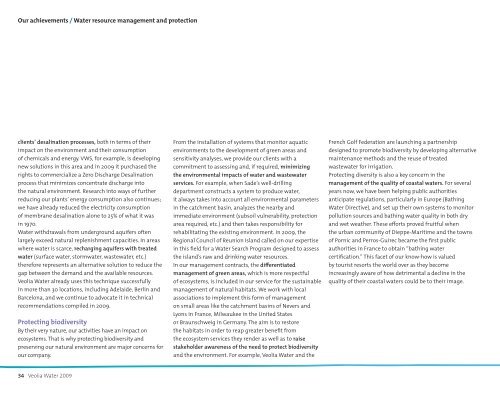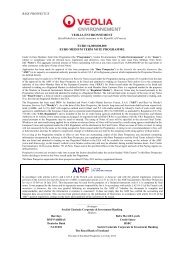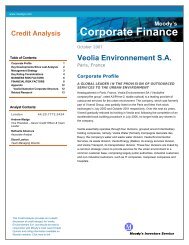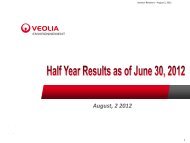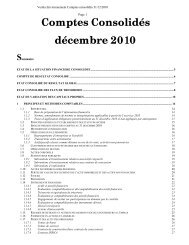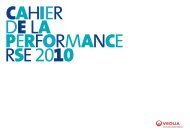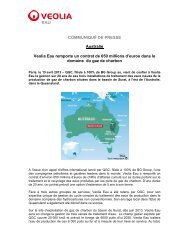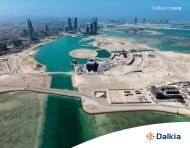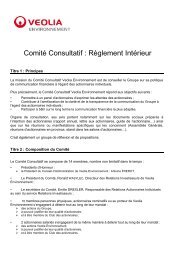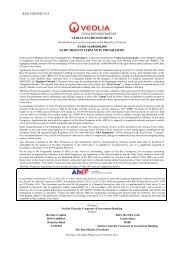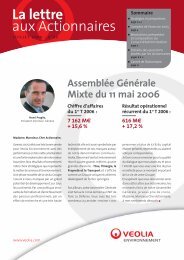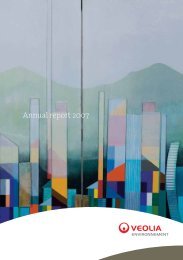Business Overview 2009 (pdf - 6.8MB) - Veolia Water
Business Overview 2009 (pdf - 6.8MB) - Veolia Water
Business Overview 2009 (pdf - 6.8MB) - Veolia Water
You also want an ePaper? Increase the reach of your titles
YUMPU automatically turns print PDFs into web optimized ePapers that Google loves.
Our achievements / <strong>Water</strong> resource management and protection<br />
clients’ desalination processes, both in terms of their<br />
impact on the environment and their consumption<br />
of chemicals and energy. VWS, for example, is developing<br />
new solutions in this area and in <strong>2009</strong> it purchased the<br />
rights to commercialize a Zero Discharge Desalination<br />
process that minimizes concentrate discharge into<br />
the natural environment. Research into ways of further<br />
reducing our plants’ energy consumption also continues;<br />
we have already reduced the electricity consumption<br />
of membrane desalination alone to 25% of what it was<br />
in 1970.<br />
<strong>Water</strong> withdrawals from underground aquifers often<br />
largely exceed natural replenishment capacities. In areas<br />
where water is scarce, recharging aquifers with treated<br />
water (surface water, stormwater, wastewater, etc.)<br />
therefore represents an alternative solution to reduce the<br />
gap between the demand and the available resources.<br />
<strong>Veolia</strong> <strong>Water</strong> already uses this technique successfully<br />
in more than 30 locations, including Adelaide, Berlin and<br />
Barcelona, and we continue to advocate it in technical<br />
recommendations compiled in <strong>2009</strong>.<br />
Protecting biodiversity<br />
By their very nature, our activities have an impact on<br />
ecosystems. That is why protecting biodiversity and<br />
preserving our natural environment are major concerns for<br />
our company.<br />
From the installation of systems that monitor aquatic<br />
environments to the development of green areas and<br />
sensitivity analyses, we provide our clients with a<br />
commitment to assessing and, if required, minimizing<br />
the environmental impacts of water and wastewater<br />
services. For example, when Sade’s well-drilling<br />
department constructs a system to produce water,<br />
it always takes into account all environmental parameters<br />
in the catchment basin, analyzes the nearby and<br />
immediate environment (subsoil vulnerability, protection<br />
area required, etc.) and then takes responsibility for<br />
rehabilitating the existing environment. In <strong>2009</strong>, the<br />
Regional Council of Reunion Island called on our expertise<br />
in this field for a <strong>Water</strong> Search Program designed to assess<br />
the island’s raw and drinking water resources.<br />
In our management contracts, the differentiated<br />
management of green areas, which is more respectful<br />
of ecosystems, is included in our service for the sustainable<br />
management of natural habitats. We work with local<br />
associations to implement this form of management<br />
on small areas like the catchment basins of Nevers and<br />
Lyons in France, Milwaukee in the United States<br />
or Braunschweig in Germany. The aim is to restore<br />
the habitats in order to reap greater benefit from<br />
the ecosystem services they render as well as to raise<br />
stakeholder awareness of the need to protect biodiversity<br />
and the environment. For example, <strong>Veolia</strong> <strong>Water</strong> and the<br />
French Golf Federation are launching a partnership<br />
designed to promote biodiversity by developing alternative<br />
maintenance methods and the reuse of treated<br />
wastewater for irrigation.<br />
Protecting diversity is also a key concern in the<br />
management of the quality of coastal waters. For several<br />
years now, we have been helping public authorities<br />
anticipate regulations, particularly in Europe (Bathing<br />
<strong>Water</strong> Directive), and set up their own systems to monitor<br />
pollution sources and bathing water quality in both dry<br />
and wet weather. These efforts proved fruitful when<br />
the urban community of Dieppe-Maritime and the towns<br />
of Pornic and Perros-Guirec became the first public<br />
authorities in France to obtain “bathing water<br />
certification.” This facet of our know-how is valued<br />
by tourist resorts the world over as they become<br />
increasingly aware of how detrimental a decline in the<br />
quality of their coastal waters could be to their image.<br />
34 <strong>Veolia</strong> <strong>Water</strong> <strong>2009</strong>


